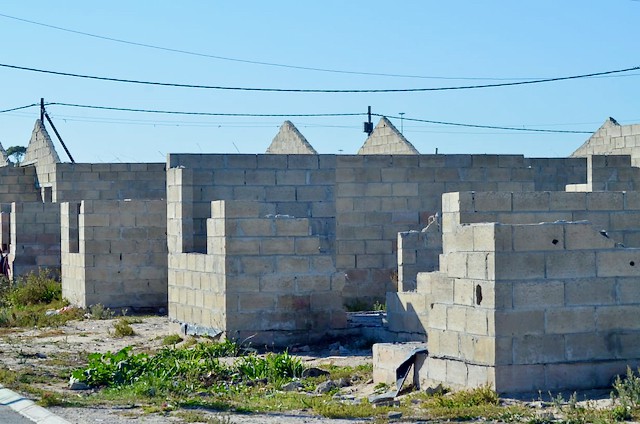Unfinished RDP houses a crime den in Nyanga
“These houses have been like this for ten years if not more”
Unfinished houses in Mpetha Square, Nyanga, Cape Town, have become a base for criminal activity, say residents. Photo: Nombulelo Damba-Hendrik
- In 2004, the Western Cape government allocated R6.5 million to build RDP houses in Mpetha Square informal settlement.
- 58 houses were built but a dispute over beneficiary lists meant the houses were never occupied.
- The houses were vandalised by 2012.
- Residents say the incomplete houses have become criminal and drug dens.
In 2004, the Western Cape government allocated about R6.5 million to build RDP houses at Mpetha Square informal settlement, Nyanga. The Masiphathisane Housing Project was for 135 beneficiaries, of which 40 were backyarders. But a dispute over who should benefit meant the houses were never occupied.
Spokesperson for the provincial Department of Human Settlements Marcellino Martin said 58 houses were built.
Some sites are only at foundation level. The houses were badly vandalised by 2012.
“These houses have been like this for 10 years if not more,” says Mpetha Square community leader Nosakhele Jolingwenya.
She said community leaders have received reports of people being raped in the unfinished houses. Some houses are marked with the names of known gangs, such as Vato and Italians. Resident say the houses are used as criminal and drug dens.
Jolingwenya said they have spent years negotiating with the department to fix the houses.
One of the houses is allocated to her. “Every day I pass it. Even when I’m standing next to my shack I can see it. And the sad part is to know what is happening inside it at night, but there’s nothing I can do,” she said. “If the department can add a roof I will move in immediately because I’m tired of living in this shack.”
She said the dispute about the beneficiary list was caused by a disagreement between the department, community leaders and disgruntled backyarders.
“When we were approved we were given house numbers and the planning is very clear on which house belongs to who. No one told us about the backyarders before until the houses were vandalised,” she said.
Resident Lindeka Rangana was also allocated a house, but it is only at foundation level. “Now there’s grass and sand. I don’t even know which slab was it,” she said.
She said in 2017 the department came back to repair houses but nothing much was done.
“Again last year there was a contractor to fix some of the houses but they did not finish … When we contacted the department they told us that they can’t send the contractor because of lockdown,” she said.
Martin said the department has set aside an additional R2.473 million to fix the vandalised units. It has currently fixed 24, of which five units will be occupied by backyarders.
Martin said the department is in the process of verifying the last 12 beneficiaries on the list and then a contractor will recommence work.
Next: Ekurhuleni “dumps” evicted families in dilapidated church for two years
Previous: “The air we breathe is killing us”: “Deadly Air” case finally goes to High Court
© 2021 GroundUp. This article is licensed under a Creative Commons Attribution-NoDerivatives 4.0 International License.
You may republish this article, so long as you credit the authors and GroundUp, and do not change the text. Please include a link back to the original article.
We put an invisible pixel in the article so that we can count traffic to republishers. All analytics tools are solely on our servers. We do not give our logs to any third party. Logs are deleted after two weeks. We do not use any IP address identifying information except to count regional traffic. We are solely interested in counting hits, not tracking users. If you republish, please do not delete the invisible pixel.



